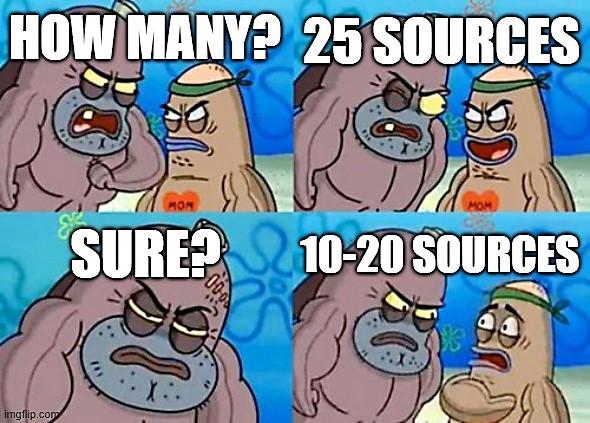The IB Extended Essay is a vital component of the IB Diploma Program, requiring students to conduct independent research and produce a 4,000-word academic paper. An essential aspect of writing a successful Extended Essay is utilizing appropriate sources to support your argument and provide a strong foundation for your research. Important questions here – how many sources for IB extended essay do you need?
As an experienced IB tutor, I will share my knowledge and insights to help you navigate source selection, offering guidelines on the recommended number of sources (minimum amount of sources and maximum number of references), types of sources, and effective source evaluation for your Extended Essay.
Recommended Amount of Sources
While there is no fixed number of sources required for an IB Extended Essay, it is crucial to find a balance between too few sources, which could limit the depth and breadth of your research, and too many sources, which might lead to superficial analysis.
The number of sources you use will depend on your subject area, research question, and the scope of your investigation.
For example, suppose you are writing an Extended Essay in History. In that case, you may need to rely heavily on primary sources, such as original documents and firsthand accounts, which may necessitate using more sources to provide a comprehensive analysis.
In contrast, an Extended Essay in Physics may require fewer sources, as the research will likely focus on a specific topic or concept, and you will need to prioritize peer-reviewed academic articles.

What is the minimum number of sources in IB EE?
As a general guideline, you might consider using a minimum of 10-15 sources for your Extended Essay, but remember that the quality of your sources is more important than the quantity.
The key is to provide a balanced and well-supported argument using various relevant, reliable, and up-to-date sources.
How many sources are the maximum for IB EE?
There is no strict maximum number of sources for an Extended Essay, but it’s crucial to use a reasonable number of references at the expense of depth and analysis. Usually, most IB EE only requires at most 20-25 sources.
Focus on selecting the most appropriate sources for your research question, and ensure that you engage critically with the material rather than merely summarizing the views of others.
Ultimately, the number of sources you use should be determined by your research needs and the demands of your specific subject area. Consult your IB supervisor for guidance on the appropriate number of sources for your Extended Essay.

Need help with your IB extended essay?
From research and analysis to structuring and editing, our skilled mentors will be by your side, helping you craft an exceptional extended essay that not only meets the wordcount and stringent IB criteria but also reflects your passion for selected IB group.
Remember, the quality of your sources takes precedence over quantity, ensuring that your research is grounded in reliable, relevant, and up-to-date information.
What sources can I use for EE?
When selecting sources for your Extended Essay, it is essential to consider the following types:
Primary sources
Original materials, such as novels, plays, poems, films, photographs, or historical documents that provide direct evidence or firsthand accounts related to your research question.
For example, if you are writing an English A Extended Essay, you will need to analyze the literary work(s) in question, which serve as primary sources.
Secondary sources
Scholarly articles, books, and critiques that analyze, interpret, or evaluate primary sources, providing a deeper understanding of your subject matter.
For instance, you may have selected Biology as a subject and if you are writing a Bio Extended Essay, you will need to consult academic articles and research studies that provide expert analyses and interpretations of the scientific data relevant to your research question.
Tertiary sources
Reference materials, such as encyclopedias, textbooks, or bibliographies, that can help you identify and locate primary and secondary sources.
While tertiary sources should not be cited as evidence in your Extended Essay, they can serve as a helpful starting point for your research.
How to select sources for IB extended essay?
As you gather sources for your Extended Essay, ensure that they meet the following criteria.

Relevance
The sources should directly relate to your research question and contribute to your argument. For example, if your research question is focused on the impact of climate change on coral reefs, select sources that specifically address this topic and provide pertinent information.
Reliability
The sources should come from reputable authors, institutions, or publications, reflecting a high level of credibility and expertise. Generally, peer-reviewed academic articles and books published by established authors or academic presses are considered reliable sources.
Currency
The sources should be up-to-date, particularly in rapidly evolving fields such as science, technology, or current affairs. Ensure that your sources reflect the latest research and developments in your subject area.
By following these guidelines and selecting appropriate sources for your Extended Essay, you will lay the groundwork for a well-researched and well-supported argument.
Using Sources Effectively
Now I will discuss best practices for incorporating sources effectively and evaluating their strengths and limitations to ensure a successful.
Balance
Strive for a balance between primary and secondary sources, incorporating both in-depth analysis and a broader context for your research.
For example, if you are writing an Extended Essay on the effects of globalization on a particular industry, use primary sources, such as company reports or interviews, alongside secondary sources like academic articles that provide broader context and analysis.
Attribution
Always cite your sources accurately and consistently, following the appropriate citation style for your subject area. This demonstrates academic integrity and allows readers to locate and verify the sources you have used.
Paraphrasing and Quoting
When using sources, aim to paraphrase and summarize the information in your own words. Use direct quotations sparingly and only when the original wording is particularly important or impactful.
Critical Engagement
Engage critically with your sources, evaluating their strengths, limitations, and potential biases. Then, offer your own interpretation and analysis, rather than merely summarizing the views of others.
My Personal TOP 3 Tips for Success
- Conduct a thorough literature review – start your research by conducting a comprehensive literature review to identify the key sources in your field and understand the existing body of knowledge related to your research question.
- Keep track of your sources – maintain a bibliography or reference management tool, such as Zotero, Mendeley, or Consensus, to help you organize and retrieve your sources efficiently.
- Seek guidance – consult with your IB supervisor or a librarian for assistance in finding appropriate sources and refining your research strategy.
Conclusion
Navigating sources for your IB Extended Essay can be a daunting task, but by following the expert guidelines provided in this article, you can lay the foundation for a well-researched and well-supported argument.
Remember, our company, ExtendedEssayWriters.com, is here to help you select topics, write an outline, write your EE RPPF or share a list of sources for topics chosen for any subject for your IB Extended Essay.

Need help with your IB extended essay?
From research and analysis to structuring and editing, our skilled mentors will be by your side, helping you craft an exceptional extended essay that not only meets the wordcount and stringent IB criteria but also reflects your passion for selected IB group.
If you prefer, we can even write the entire IB extended essay for you from scratch, ensuring that you receive a high-quality, well-researched, and expertly written Extended Essay.
Reach out to us today, and let our team of experienced writers and subject matter experts guide you on your path to success in the IB Diploma Program.







